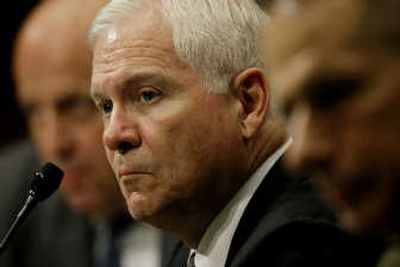Bush seeks $42 billion in additional war funds

WASHINGTON – The Bush administration asked Congress on Wednesday for $42 billion more next year for the wars in Iraq and Afghanistan, an increase that would raise spending on the wars to $189 billion in 2008 – and to more than $600 billion for Iraq alone since the U.S.-led invasion of Iraq.
War spending would be higher in 2008 than any year since the Iraq war began in March 2003. The Iraq war’s total cost is approaching that of the 1964-73 Vietnam War’s estimated total of $518 billion, in 2007 dollars.
Sen. Robert Byrd, D-W.Va., the chairman of the Senate Appropriations Committee, said the total for Iraq didn’t include indirect costs such as veterans’ care or the ultimate costs of long-term involvement, which the Congressional Budget Office has said could exceed $2 trillion.
“That’s quite a burden this president is leaving to our grandchildren,” Byrd said at a hearing at which top administration officials made their case for more money. Byrd, who’s opposed the war from the beginning, wants Congress to restrict war funding as a way to wind down U.S. involvement there.
“This committee will not – N-O-T – rubber-stamp every request submitted by the president,” Byrd said.
However, many members of Congress, both Democrats and Republicans, fear that cutting off money for the war would be the wrong way to change course because American troops might be denied the supplies and protection they need.
Bush requested $141.7 billion in February for the Iraq and Afghan wars in fiscal 2008, which begins Monday. In July he requested $5.3 billion more for Mine Resistant Ambush Protected Vehicles, which greatly increase the chances of soldiers surviving blasts from improvised explosives. The $42 billion he sought Wednesday brings the 2008 request to $189 billion. Byrd said Iraq’s costs alone would exceed $600 billion if this request were approved.
Byrd asked Defense Secretary Robert Gates what President Bush meant when he said the United States might be involved in Iraq for 50 years, just as it had remained in South Korea for five decades after the end of hostilities there.
Gates said Bush was referring to a long-term agreement worked out with the Iraqis that would involve only a “small fraction” of the number of American forces there today.
“The purpose of that kind of longer-term presence would be to continue the fight against al-Qaida, prevent foreign intervention, and train and equip Iraqi forces. It would be a very different kind of mission than our troops have today,” Gates said.